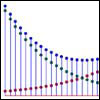Session Overview

|
In this session, we look at how to put all the components of the Signals and Systems unit together. We’ll model complex systems by breaking them down into smaller systems and combining them. Then we’ll solve for the poles of those complex systems and use them to predict long-term behavior. We can also look at a plot of poles in our system to discover how changing parameters of a small part of a complex system affects the overall behavior of that system. The overview handout provides a more detailed introduction, including the big ideas of the session, key vocabulary, what you should understand (theory) and be able to do (practice) after completing this session, and additional resources. |
Session Content
Readings
Review sections 5.1-5.7 of the course notes, which were assigned in the last two sessions. The worked examples in section 5.8 may also be useful.
Lecture Video
Watch the lecture video. The handout and slides present the same material, but the slides include answers to the in-class questions.
About this Video
System functions provide a summary of information that help optimize the design of a control system. Poles are discussed further, based on their location on the unit circle.
Session Activities
The problems in the tables below are taken from the 6.01 Online Tutor, an interactive environment that is not available on OCW. Do not try to answer these questions in the PDF files; answers will not be checked, and cannot be submitted.
Design Lab
- Design Lab 6: Sizable Following (PDF)
- Code for Design Lab 6 (ZIP) (This ZIP file contains: 3 .py files.)
| PROBLEM # | QUESTIONS |
|---|---|
| 6.1.1 | Proportional plus delay (PDF) |
| 6.1.3 | Proportional plus angle (PDF) |
Optional Exercises
| PROBLEM # | QUESTIONS |
|---|---|
| 6.2.1 | Control system analysis (PDF) |
| 6.2.2 | System representations (PDF) |
Check Yourself
Nano-Quiz
Nano-quiz problems and solutions are taken from a previous version of the 6.01 Online Tutor. Do not try to answer these questions in the PDF files; answers will not be checked, and cannot be submitted.










